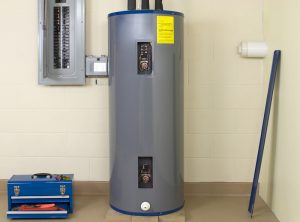 And, should you upgrade to tankless? Well, maybe.
And, should you upgrade to tankless? Well, maybe.
Stick around and we’ll share with you not only the biggest signs that your tank water heater is about to call it quits—but some of the benefits and drawbacks of going tankless. A tankless water heater installation isn’t the right choice for every home, but it can be a great choice for many. Keep reading to learn more!
How Old Is Your Water Heater?
Most tank model water heaters tend to last about 15–20 years. If your water heater is older than two decades, it’s probably best to upgrade to a newer system. A decline due to age will happen, and even if your water heater is working “okay” right now, that can quickly change for an older system.
Is There a Loss of Hot Water Volume?
That is, are people in your home going with cold showers when they didn’t used to? If you feel that you’re no longer getting the amount of hot water in your home that you expect, you may be dealing with an inefficient water heater—this is particularly true if it’s coupled with old age.
Take a Look at Your Energy Bills
Did you know that hot water accounts for most of the heating energy in your home? So if your hot water heater begins working inefficiently due to age, then it’s a good idea to have it checked out by a pro—it may be economically beneficial to have it replaced soon.
Check for Corrosion
Tank water heaters are equipped with a component called the anode rod. This part is responsible for absorbing rust and corrosion so that the lining of your tank water heater doesn’t. They’re designed to last a while, but not the entire lifespan of your system. So if yours hasn’t been replaced, or if you have noticed signs of corrosion elsewhere, it may be time to replace the system.
“Should I Go Tankless?”
There is a good reason many homeowners in our area are choosing to “go tankless” when it comes to their water heater. These water heaters operate on an “on-demand” principle—this means that their heating elements only turn on and heat the water when a hot water tap is turned on. The tank model, however, heats and stores hot water for later use. Tank models are often called inefficient due to the standby energy loss that occurs when nobody uses hot water.
In addition to energy savings, choosing a tankless water heater installation means:
- You won’t “run out” of hot water. While a tankless system can be overwhelmed if too many appliances demand hot water at once, you’ll essentially never “run out” of stored hot water, because there is no hot water being stored.
- The system is small and saves space. Tankless water heaters don’t take up near as much space as tank models do. They can be mounted up on a wall mostly out of sight, and you can use the space that your tank model was in for storage.
- It lasts longer. Tankless water heaters undergo less stress than their tank counterparts. This means they’ll last longer on average, leading to cost savings for you.
Now, we will admit that there is one important reason some homeowners choose not to go tankless: the cost of installation. Although you’ll pay back that installation cost in a few years due to your monthly energy savings, it is a point of concern to consider.
See what keeps our customers saying “I Love My Design Comfort”! Contact us today to learn more about your water heater options.


